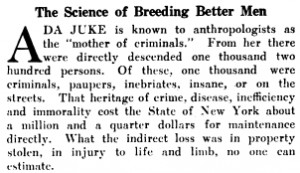Alexis Carrel, Nobel Prize Winner. Man the Unknown, 1939. [Source] A choice must be made among the multitude of civilized human beings. We have mentioned that natural selection has not played its part for a long while. That many inferior individuals have been conserved through the efforts of hygiene and medicine. But we cannot prevent …
Category: national degeneration
Karl Pearson on ‘race-suicide’ (1907)
Quoted by Collin Wells in 1907: As Karl Pearson has recently said: The great problem is whether limitation has not begun at the wrong end. If a nation is to be strong, there must be wastage; the reckless and diseased must not be in a condition to multiply like the strong and able. At present …
Foster Kennedy: Euthanasia for “Nature’s Mistakes” up to the age of 5
Kennedy’s address at the 97th annual meeting of the American Psychiatric Association in 1941 encapsulates well how the acceptance of evolution and utilitarian thinking are tied into arguments for eugenics (and euthanasia), which is ironic, of course, since many advocates for euthanasia deny such connections and modern proponents of evolution become apoplectic at the insinuation …
Eugenics as a Religion and Social Darwinism, Collin Wells
Source: Dr. Collin Wells, “Social Darwinism” a paper presented in 1907, found in The American Journal of Sociology, pages 706-709 Finally, what is the evolutionary value of certain ideals? Let us take individualism, the ideal of democracy, which has tacitly figured in many of the phenomena to which I have already referred. Let us go …
Child Labor Laws as Eugenics Policy
Source: Dr. Frank a Fetter, Cornell University, in a discussion of “Western Civilization and the Birth-Rate”, as found in The American Journal of Sociology, 1907, page 619. The paper mentions but one recent social change which tends definitely and positively to reduce the families of the unskilled classes, namely, child-labor legislation. Such laws as these …
Scientific American: “The Science of Breeding Better Men” 1911
Editorial from a 1911 edition of Scientific American [Source]: Sci-Am’s Editor’s note: This editorial was written and published in 1911. Although our editors of a century ago pondered some lofty aspirations for the orderly future of humans, it was only three decades later that the brutal reality of a Nazi social order suffused with a …


Recent Comments